Editor’s Note
As of May 2022, many formulas have become increasingly difficult to find. Please read our article, What To Do If You Can’t Find Baby Formula, for more information regarding the formula shortage.
While Similac Spit Up is no longer made, Similac has formula such as Similac Pro-Total Comfort and Similac Pro-Sensitive, which is for babies with sensitive tummies. While these formulas are not specifically designed for spitting up, they do help with gassiness, fussiness, and sensitive tummies. We will keep you updated on the shortage for these Similac products.
Motherhood is no joke, and it feels like the joke is on you when your infant has feeding troubles. Between diaper changes, loss of sleep, and all of the other nuances of taking care of another human life, the last thing a mother should need to worry about is feeding her baby. But, many infants have difficulties such as acid reflux or constant spit ups. This can be extremely frustrating for parents, and can make baby feel miserable.
Luckily, we live in a day and age where science and formula companies have combined forces to produce a solution. A handful of the major formula companies have created formulas for babies with problematic reflux. There are two types of infant reflux: gastro-esophageal reflux (GER) and gastro-esophageal reflux disease (GERD). All babies experience some amount of spitting up because the muscle at the top of the stomach is immature at birth. During the first year of life, this muscle tightens, and becomes more efficient at keeping feedings within the stomach. However, when reflux is excessive or associated with discomfort, your pediatrician may recommend a formula change. In this post, I compare Similac for Spit Up Infant Formula with Iron to Enfamil A.R. Infant Formula to help you decide which is the best choice for your baby. Each baby will tolerate the ingredients of the formulas differently, so there may be a trial and error process before you discover the best option. Even if your baby takes both formulas with ease, there are other factors to consider.
Similac Spit Up
Similac Spit Up is designed to significantly reduce reflux episodes with the addition of rice starch. It also contains DHA, lutein and vitamin E as well as non-GMO ingredients. Every baby responds slightly differently to each formula recipe, but the majority of parent online reviews state that Similac Spit Up is helpful.
Enfamil AR
Enfamil boasts that it has “the number one brand of spit up formula,” with its rice starch containing AR product. This starch develops a thicker consistency once in contact with acid and digestive enzymes in the stomach. The formula becomes more viscous, and, therefore, more likely to remain inside of the stomach.
The Spit Up Test
Let’s discuss what parents need to know: how well do these formulas reduce reflux? This will, again, depend on your baby, and whether or not there are other medical issues. It’s best speak to a doctor, and give either formula option a few day to one week trial. You may notice less spit up as soon as the first feeding. Pay careful attention to your baby’s cues, or consider keeping a “Feeding Journal” to write down the response to each formula feeding.
According the manufacturer, Similac Spit Up is “clinically shown to reduce frequent spit up by 54%.” Enfamil claims that AR “has been shown to reduce spit up by 50%.” Although Similac Spit Up may be slightly more effective, this difference may not be noticeable to parents.
Price
Enfamil AR formula is marginally more expensive than Similac Spit Up. Parents, however, will choose whichever formula helps their baby the most, so this may be a small deterrent.
You will save a lot of money by buying the powdered version of either brand’s formula. The pre-made versions will always be more expensive, albeit a lot less work for you. Some parents reported that the ready-to-feed formulas have a smoother texture which reduces nipple clogging, making feeding easier. However, there is no need to wash a pre-made bottle, and you will save water. This is a luxury that some parents, especially when traveling, find is worth the additional cost. The Enfamil AR single-serving pouches are also slightly more expensive than the formula powder in cans.
Availability
Similac Spit Up is available in both powdered and pre-made bottles. Unfortunately, no single-serving pouches are currently available. The majority of parents buy the powdered version which is the most economical choice. Ready-to-feed bottles are also available, saving parents the task of formula preparation. This version also has a smoother formula consistency than the powdered type. This can be a big deal for the parents of picky feeders.
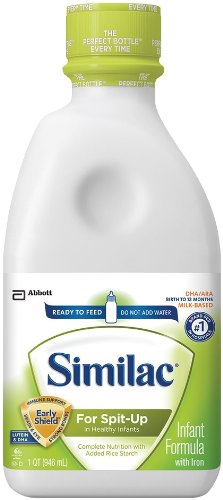
Enfamil AR is available in a powder, pre-made bottles, and individual serving pouches to easily make bottles on-the-go. In my opinion, the single-serve pouches are a huge perk of Enfamil AR. We all know that a lot of coordination and planning is necessary prior to a trip out away from home, and these to-go pouches take the guesswork out of preparation.
Both brands are available at most major grocery stores as well as online.
Additional Nutrients
Similac Spit Up contains the company’s patented OptiGRO with lutein, DHA and vitamin E for your baby’s brain, eye, and immune system development. This is a huge benefit, as numerous studies show that DHA is extremely important for brain development, as well as for the eyes (source). The brain and eyes of infants are constantly developing during the first year of life, and the added nutrients can truly help your growing baby.
Similac Spit Up is made with non-GMO ingredients, a huge plus in my opinion. Genetically modified organisms (GMOs) are plants or animals whose DNA has been genetically altered in a lab for nutritional or pest control purposes. While they benefit the farming industry, the jury is still out on whether or not they benefit our bodies. Numerous countries have banned GMOs citing health concerns, although they are still legal to sell in the United States (source). In my opinion, it’s great that Similac has chosen to only use non-GMO ingredients in their products.
To remain competitive, Enfamil AR has added their Natural Defense Dual Prebiotics Blend to assist your baby’s digestion. Prebiotics are fiber that provide “food” for the healthy bacteria inside of the intestines. This promotes better digestion, and boosts the immune system. While the added rice starch helps to reduce episodes of reflux, the prebiotics improve your baby’s digestive health.
Reviews
The reviews of Similac Spit Up show a number of happy parents who switched and had success with this formula. Parents love the ready-to-feed version the most, and only a few complained of difficulty in preparing the powdered version (i.e. clump formation).
The parent reviews of Enfamil AR are similar, with more of an emphasis on product texture. A number of parents complained that the powdered formula became thickened inside of the bottle, and clogged the nipple during feedings.
In both cases, there were reviews from parents who preferred other formula options for their infants with GER or GERD. As previously stated, it really depends on your baby.
Fussy Formula War Winner
Like I’ve said over and over again, every baby is different, even in regards to reflux and digestion. It’s best give either Similac Spit Up or Enfamil AR a one week trial before switching to another formula. If still unsure, speak to your baby’s doctor.
If my infant tolerates both formulas well, my choice would be Similac Spit Up for sure. Why?
- Price – Sure, there’s only a dollar or two difference between the two formulas, but you will purchase this product frequently. The extra cost can really add up. If my baby tolerated the cheaper option as well as the more expensive one, I would definitely take this into consideration.
- Non-GMO ingredients and added DHA, lutein, and vitamin E – The non-GMO ingredients are a huge thing for me; I personally try to limit GMO foods in my family’s diet because I worry about potentially adverse health effects. A newborn baby needs the best possible nutrition, and knowing that Similac Spit Up does not contain GMOs puts my mind at ease. Although Enfamil AR does have DHA and vitamin E, I love that Similac also adds lutein for its additional benefits for the developing brain and eyes. Knowing that my baby is getting a dose of this with each feeding is very reassuring.
- There are rave reviews of Similac Spit Up from parents who are very happy that their baby spits up less. Ultimately, I would choose Similac Spit Up formula. While reading the reviews of both products, I was reminded of the difficulties of newborn motherhood, and how much harder life is when your baby has discomfort and feeding issues. Take the time to discover which formula is best for your baby, and don’t forget to ask your pediatrician, spouse, family and friends for help. Rest assured that you will find a solution. The American Academy of Pediatrics also offers tips on how to reduce spit ups and the symptoms of GERD (source).
Enfamil vs Similac at the brand level
We’ve also written a comprehensive comparison of Enfamil vs Similac, highlighting the differences between these leading formula makers. It provides summary comparisons of the best selling products within each brand.
Enfamil prioritizes less sugar in their infant formulas, although there is certainly some sugar present. Taste is sacrificed for nutritional benefits.
Similac generally produces better tasting formulas which, in some cases, means a higher sugar content. Although both brands offer non-GMO options, Similac seems to excel in this arena.
Both brands have a large selection of formulas, so do read the full comparison article to get a more detailed explanation of each option.
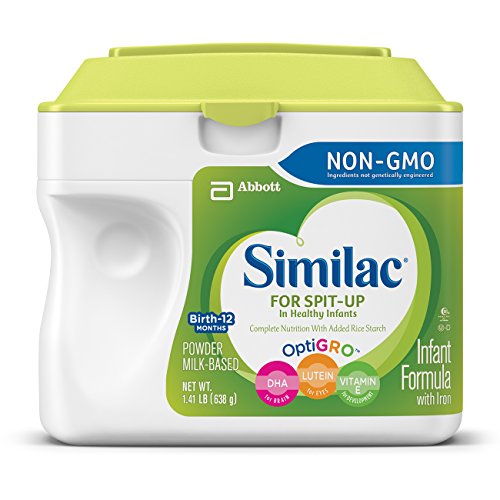
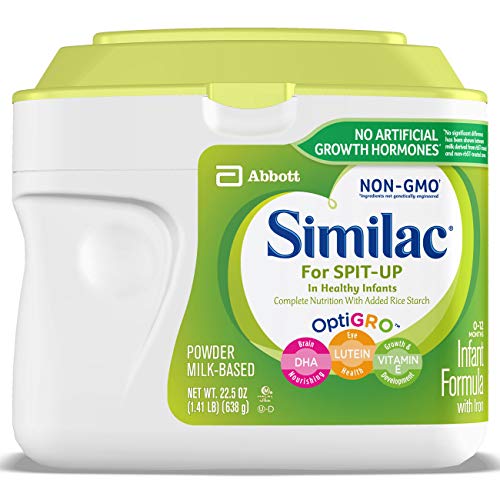





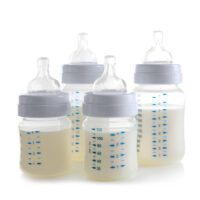
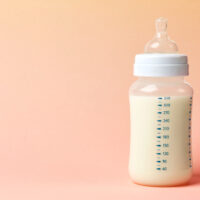
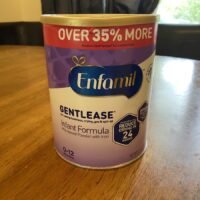
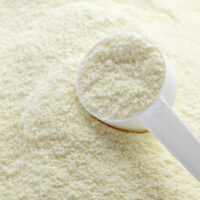
Thank you for this! I have been researching for days and was leaning towards the Similac but now am definitely going to try it. Baby has been only breastfed and fed bottles of pumped milk for 6.5 weeks but this past week he has had spit up/reflux so bad I haven’t been able to sleep. I am going to mix half of the formula with breast milk and see if it helps. Will post an update in the near future! Many thanks
Jen, how did it go for you? With doing half and half? I have this same issue.